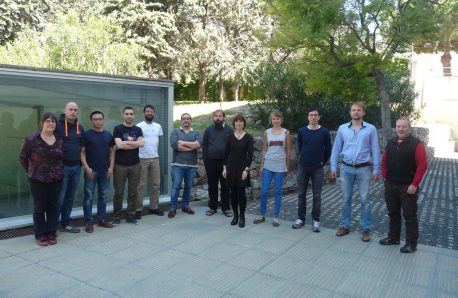López
Research group

Abstract
The aim of the group is to employ atomistic simulations to understand the mechanisms that govern chemical processes in heterogeneous catalysis and other materials that might be appealing due to their ability to extract, store or provide energy. Both the analysis of reaction networks, activity and selectivity issues and the final tests on the stability of the potential materials are fundamental to establish a solid background to determine the potentialities of catalyst candidates for a given chemical transformation.
As for the new energy materials their performance and stability are two of the main goals in our research.
Our collaboration with several experimental groups is of fundamental importance to define and compare models that can later be applied to suggest experiments and new materials to be explored. To this end, the use of massive computational resources, as those provided by the RES-BSC is required. We are thankful to them for these resources that help in placing us as players at the European level.
Topics addressed
- Atomistic simulations of chemical processes in heterogeneous catalysis.
- Understanding new energy materials’ performance and stability.
Articles
“Advances in the Design of Nanostructured Catalysts for Selective Hydrogenation”
ChemCatChem (2016), 8, 1–33
G. Vilé, D. Albani, N. Almora-Barrios, N. López, J. Pérez-Ramírez
“Understanding and Tuning the Intrinsic Hydrophobicity of Rare-Earth Oxides: A DFT+U Study”
ACS Appl. Mater. Interfaces, (2016) 8, 152–160
G. Carchini, M. García-Melchor, Z. Łodziana, N. López
“NH3 sensing with self-assembled ZnO-nanowire μhP sensors in isothermal and temperature-pulsed mode”
Sensors and Actuators, B: Chemical (2016) 226, 1, 110–117
F. Shao, J.D. Fan, F. Hernández-Ramírez, C. Fàbrega, T. Andreu, A. Cabot, J.D. Prades, N. López, F. Udrea, A. De Luca, S.Z. Ali, J.R. Morante
“Ligand ordering determines the catalytic response of hybrid palladium nanoparticles in
hydrogenation”
Catal. Sci. Technol., (2016), 6, 1621–1631
D. Albani, G. Vilé, S. Mitchell, P. T. Witte, N. Almora-Barrios, R. Verel, N. López, J. Pérez-Ramírez
“Multigrid-Based Methodology for Implicit Solvation Models in Periodic DFT”
J. Chem. Theory Comput. (2016) 12, 1331–1341
M. García-Ratés, N. López
“Diversity at the water-metal interface: metal, water thickness, and confinement effects”
ACS Cent Sci. (2016), 2, 109–116
L. Bellarosa, R. Garcia-Muelas, G. Revilla-López, N. López
“Interplay between surface chemistry and performance on rutile-type catalysts for halogen production”
Chem. Sci. (2016) 7, 2996–3005
M. Moser, V. Paunović, Z. Guo, L. Szentmiklósi, M. G. Hevia, M. Higham, N. López, D. Teschner, J. Pérez-Ramírez
“Computationally Probing the Performance of Hybrid, Heterogeneous, and Homogeneous Iridium-Based Catalysts for Water Oxidation”
ChemCatChem (2016) 8, 1792 – 1798
M. García-Melchor, L. Vilella, N. López, A. Vojvodic
“The interplay between homogeneous and heterogeneous phases of PdAu catalysts for the oxidation of alcohols”
ACS Catal., (2016) 6, 4135–4143
J. Jover, M. Garcia-Ratés, N. López
“Site-selectively grown SnO2 NWs networks on micromembranes for efficient ammonia sensing in humid conditions”
Sensors and Actuators B (2016) 232, 402–409
J. Samà, S. Barth, G. Domènech-Gila, J. D. Pradesa, N. López, O. Casals, I. Gràcia, C. Cané, A. Romano-Rodríguez
“Glycerol oxidehydration to pyruvaldehyde over silver-based catalysts for improved lactic acid production”
Green Chem., (2016) 18, 4682–4692
G. M. Lari, R. García-Muelas, C. Mondelli, N. López, J. Pérez-Ramírez
“Catalyst and Process Design for the Continuous Manufacture of Rare Sugar Alcohols by Epimerization–Hydrogenation of Aldoses”
ChemSusChem, (2016) 3407-3418
G. M. Lari, O. G. Gröninger, Q. Li, C. Mondelli, N. López, J. Pérez-Ramírez
“Reactivity descriptors for ceria in catalysis”
App. Catal. B-Environ., (2016) 197, SI, 299-312
M. Capdevila-Cortada, G. Vilé, D. Teschner, J. Pérez-Ramírez, N. López
“A Database of the Structural and Electronic Properties of Prussian Blue, Prussian White, and Berlin Green Compounds through Density Functional Theory”
Inorg. Chem., (2016), 55, 12851–12862
F. S. Hegner, J. R. Galán-Mascarós, N. López
“Performance of DFT+ U Approaches in the Study of Catalytic Materials”
ACS Catal. (2016) 6, 8370–8379
M. Capdevila, Z. Łodziana, N. López